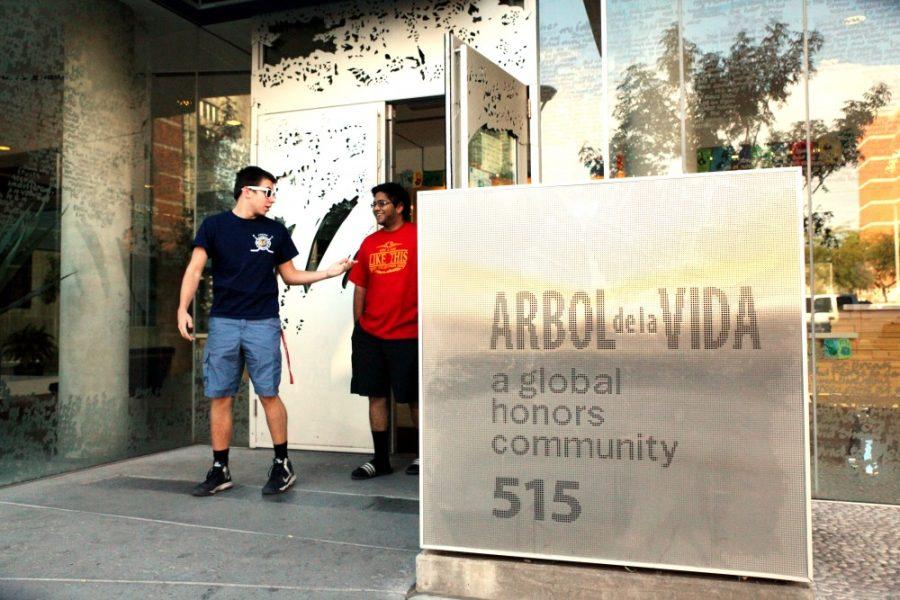Residence Life has opened honors residence hall Árbol de la Vida to non-honors students for the first time, and some honors students said they are seeing the differences with a louder and less academic atmosphere.
Árbol opened in 2011 as an exclusively honors residence hall. This semester it opened its doors to all students for the first time, a change that might have been caused by the smaller incoming honors class this year. There were 834 incoming honors freshmen in the fall, compared to last year’s 1,214. The Honors College decided to admit a smaller incoming class so it would still be able to serve the students, said Patricia MacCorquodale, dean of the Honors College.
“We can’t have more students than we can reasonably serve with the resources and space that we have available,” MacCorquodale said.
Although the freshman class shrank, there were 4,591 total honors students last year, while this year, there are 4,507 — signifying only a small drop in overall students in the Honors College, MacCorquodale said.
There are about 128 non-honors students currently living in the honors dorm, according to Jennifer Hiatt, executive director of Residence Life. The Honors College was not able to fill all 719 spaces in Árbol, which is why, in the middle of summer, the dorm was opened to non-honors students.
For the most part, students have pulled their non-honors roommates into their room, which means that an honors student requested for their non-honors friend to be transferred to their room, Hiatt said.
“This has not happened before. They [the Honors College] have filled it each year with honors students,” Hiatt said. “This is the first time we’ve had this number of non-honors students in there.”
Some honors students said they have seen a significant increase in the noise level, as well as the number of students going out on the weekends.
Rob Gonzalez, an aerospace engineering sophomore who is living in Árbol for the second year, said “the scholastic quiet has disappeared.”
“Last year was definitely positive. I had friends where, if they wanted to go to sleep at 9 p.m., they could go to sleep at 9 p.m. You can’t do that anymore,” Gonzalez said. “I don’t know if it is because people are more sociable or what, but it is definitely a louder place. If you want to get work done now, it is a lot harder.”
Jan Melendez, a mechanical engineering junior and National Hispanic Scholar, is living in Árbol for the third year in a row and said he feels non-honors students have changed the atmosphere of the dorm. He said there are more people going out on Thursdays and Saturdays and that he always hears loud music.
However, statistics show there haven’t been as many complaints as in previous years.
By this time last year, according to Nicholas Sweeton, senior director of residential education for Residence life, there had been a total of eight “Noise Policy Violations Resulting in a Finding of ‘Responsible’’ in Árbol. This year, there have only been six noise violations. There had been two “Illegal Drug Violations Resulting in a Finding of ‘Responsible’” at this time in fall of 2012, while there have not been any violations so far this semester. However, this year’s residents have racked up 13 “Alcohol Violations Resulting in a Finding of ‘Responsible’” compared to last year’s seven at this time.
“Overall, the numbers are actually pretty much the same, there is no statistically significant difference in the violation rates,” Sweeton said in an email. “Given that our numbers are similar to last year, it does not appear that the presence of non-honors students had much of a statistical difference in terms of overall conduct numbers.”
Sweeton also said Residence Life is taking this as an opportunity to measure the impact of placing non-honors students near honors students to see if a “halo effect” occurs. Residence Life officials will be able to measure variables such as retention rates, average GPA and graduation rates to test the theory at the end of the year.
At this point, MacCorquodale said it is too early to tell what the impact of non-honors students living in the honors dorm might be.
“We hope that the overall ethos of the hall and the environment has the same character that it had before,” MacCorquodale said. “It’s something we’ll obviously be looking at during the year. … I think we’ll have to wait and see what happens and how it works out.”









